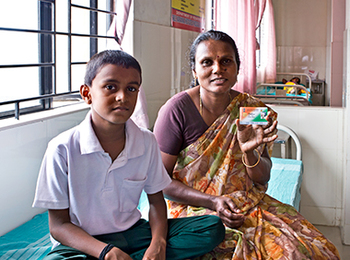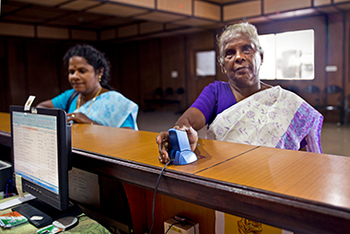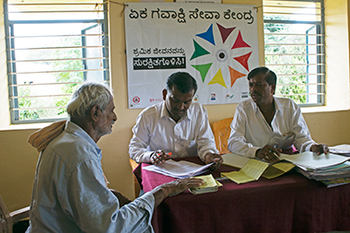Improving social security in India
Programme description
Title: Indo-German Social Security Programme
Commissioned by: German Federal Ministry for Economic Cooperation and Development (BMZ)
Country: India
Lead executing agency: Ministry of Health and Family Welfare
Overall term: 2011 to 2020

Context
More than 400 million people – around 88 per cent of India’s labour force – are employed as daily wage labourers without contracts, as landless farm labourers or as small traders. The majority of these informal workers and their families have no access to appropriate social security. Families can fall into poverty as a result of unforeseen expenses and loss of income due to illness, accidents or death of the primary earner, or as old age reduces their earning opportunities. India’s central and state governments offer a range of social security programmes. However, these programmes are often poorly organised and difficult to access for workers in the informal sector.
Objective
The social security system for informal workers and their families has improved.

Approach
The Indo-German Social Security Programme (IGSSP) provides policy advice, strengthens the capacities of ministries and other stakeholders, develops training materials, carries out evaluations, offers IT advice, and develops monitoring instruments and information campaigns for informal workers.
The programme has two main fields of activity. Firstly, a national health insurance scheme for the poor is being designed and introduced. In addition, it improves the coordination of different social security programmes and promotes closer cooperation.
The lead executing agency of the programme is the Indian Ministry of Health and Family Welfare (MoHFW). In the past, the programme has advised MoHFW on the implementation of Rashtriya Swasthya Bima Yojana (RSBY), a social health insurance scheme for India’s poor, which was active until late 2018. Currently, the programme is supporting MoHFW and the newly established National Health Authority (NHA) in designing and implementing a new major health reform. This reform entails setting up a national health insurance scheme called Pradhan Mantri Jan Arogya Yojana (PM-JAY). The scheme aims to increase the number of insured persons substantially to 500 million and vastly improve the quality and scope of health services for the poor and vulnerable.

Results
Scaling-up of India’s national health insurance: Until the current health reform, RSBY was one of the world’s largest health insurance schemes in terms of the number of beneficiaries. In March 2016, over 41 million poor households with approximately 125 million persons were enrolled in the scheme. The new health insurance is more ambitious: it is the world’s largest fully state-funded health insurance scheme.
Better access to health care for the poor: RSBY covered around 11.8 million hospitalisations in more than 10,000 registered hospitals.
Improved medical coverage for women: The percentage of women insured under RSBY rose from 41 to 49 per cent in a period of four years.
Lower out-of-pocket expenditure for hospital treatment: Independent evaluations show that families covered under RSBY have had lower out-of-pocket expenditure on inpatient care.
Use of innovative IT instruments: Using innovative technologies, entitlement to health care can be easily verified and electronically processed. This has improved the efficiency of government programmes and made them more inclusive.
Strengthening capacities in government agencies: Thanks to the GIZ Professional Programme, which provides training for managers and specialists implementing health insurance in India, the capacities of government agencies have been sustainably strengthened.
Establishment of Single Window Service Centres (SWSCs): The Government of Karnataka has opened around 1,200 SWSCs in all 30 districts of the state following a pilot phase in which IGSSP demonstrated the benefits of such centres for informal workers.
Improved livelihoods for the elderly: Together with the non-governmental organisation HelpAge India, the programme has set up more than 900 elderly self-help groups (ESHGs) with a total of 12,400 members in the state of Bihar.